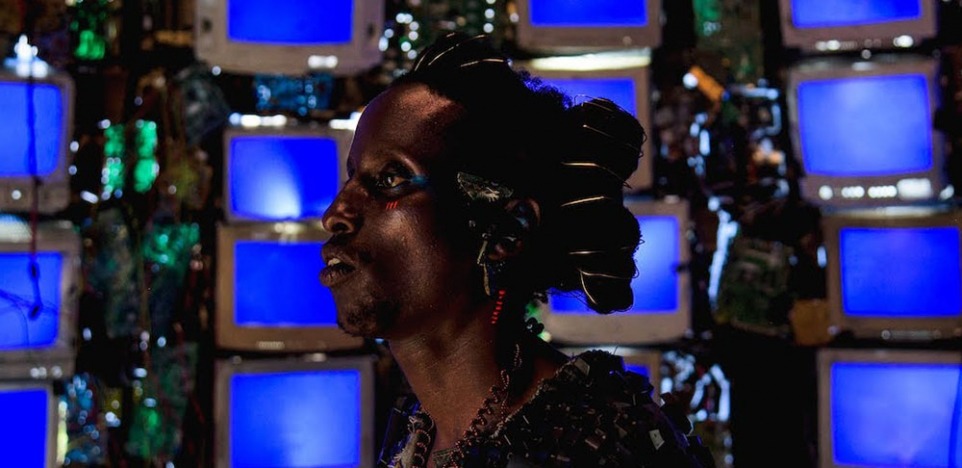Like the most astonishing prophetic revelations, Neptune Frost is impossible to aptly interpret. It’s a visceral experience that must be approached with generous curiosity. For viewers willing to be absorbed into its vibrant truth-telling, the film unfurls like a sacred ritual that will leave them changed, even if they can’t quite name what’s happened to them.
The film’s genre is most appropriately defined as African-futurist, a label coined by author Nnedi Okorafur to name a creative aesthetic and philosophy that fuses African culture, history, mythology, point of view, and technology, but this moniker is just the foundation of Neptune Frost’s slippery magic. Exploding through infectious song, dazzling visuals, and constantly shifting plot points, this is no mere fantastical escape from reality. This is a rousing feast for anyone who is hoping to witness the future of cinema, the future of collective liberatory action, and the future of humankind.

Though the unfolding of the plot is less important than the overall adventure, Neptune Frost’s characters are no mere symbols. Prescient and ingenious co-directors Saul Williams and Anisia Uzeyman populate their Burundi landscape with seekers and disruptors, focusing on a collective of technology hackers who lead a revolution against the capitalistic empires who have them invisibly mining the ingredients that keep the rest of the world outfitted in screens and devices. Several disoriented dreamers find themselves key players in the homebase of this insurgency, chief among them Neptune, a gender-fluid social outcast played both by Cheryl Isheja and Elvis Ngabo; Matalusa (Bertrand Ninteretse), a fugitive coltan miner; and Psychology (Trésor Niyongabo), a radicalized student.
Coltan is a cherished mineral that powers cell phones and computers and even as Neptune Frost transfixes its audience, the film doesn’t shy away from blatantly criticizing a colonialist society that turns its attention away from exploited labor. In an opening scene, Matalusa’s brother is killed by a guard as he takes a mesmerized moment from his work mining the rocks for this resource. The message is clear: Our unchecked addiction to acquiring the latest technological gadget is killing very real human bodies and spirits.

The uplifting and celebration of these bodies and spirits is Neptune Frost”s main intention, and the film’s deep compassion is most profoundly embodied in its showcasing of Neptune’s journey. Starting off an abused adolescent with a boy identity forced upon them, Neptune finds themselves while on the road to the hacker collective, not only blossoming into a beautiful, more feminine creature but also gaining superpowers that give them access to the unseen nooks and crannies baked into the wiring of our digital connections. Though this all might sound high concept, the transformation occurs so organically that it feels simultaneously inevitable and earth-shaking. It’s a smart and soul-stirring excavation of gender identity that deepens the film’s main critique and further queers the film’s messages.
In a world where we believe we can be more connected than ever, Neptune Frost reveals truths from which many continue to keep themselves disconnected. It offers the visions, the sounds, and the honesty and leaves it to us to choose between hypnotized privilege and the hopeful, transformative horizons just beyond our immediate periphery. It is a rhythmic rallying cry for imaginative justice-seeking, inviting all to look up from their devices and give in to the mysterious pull to co-creative liberation.
